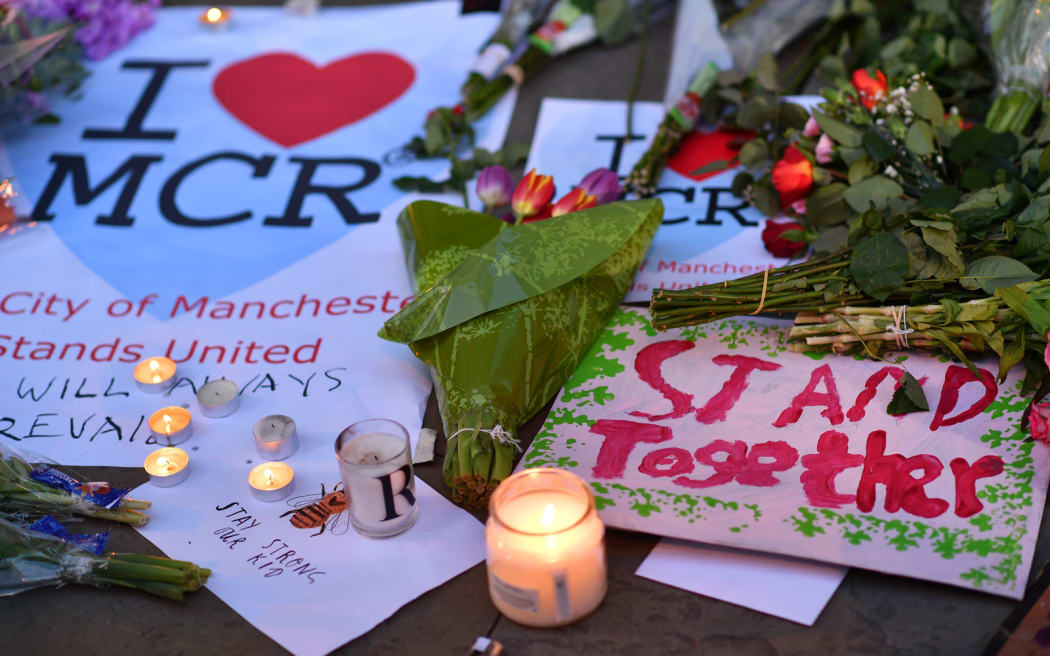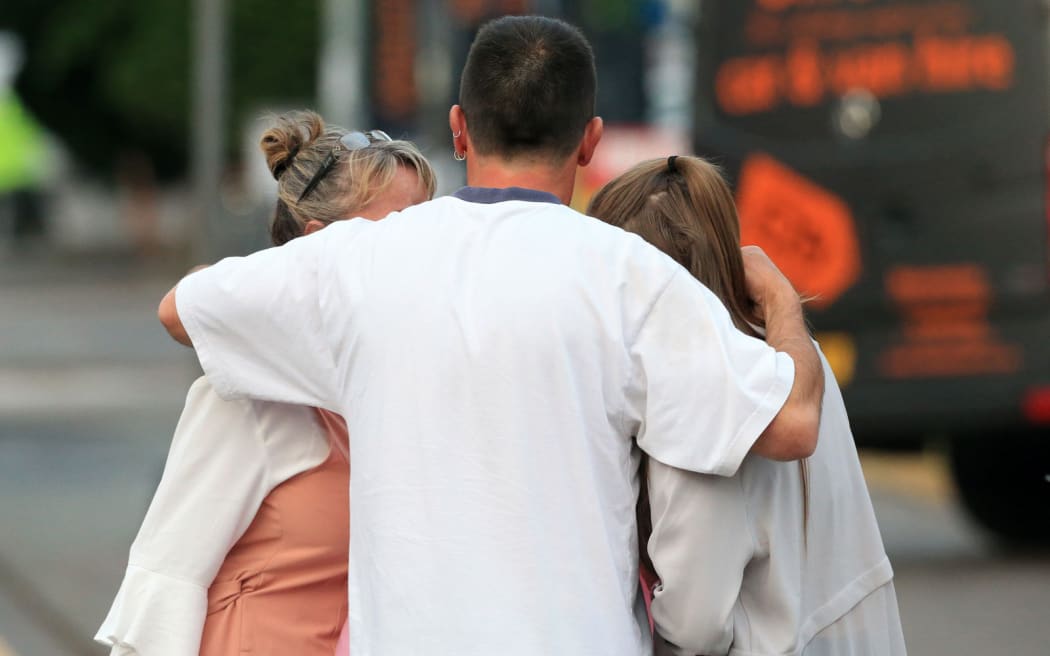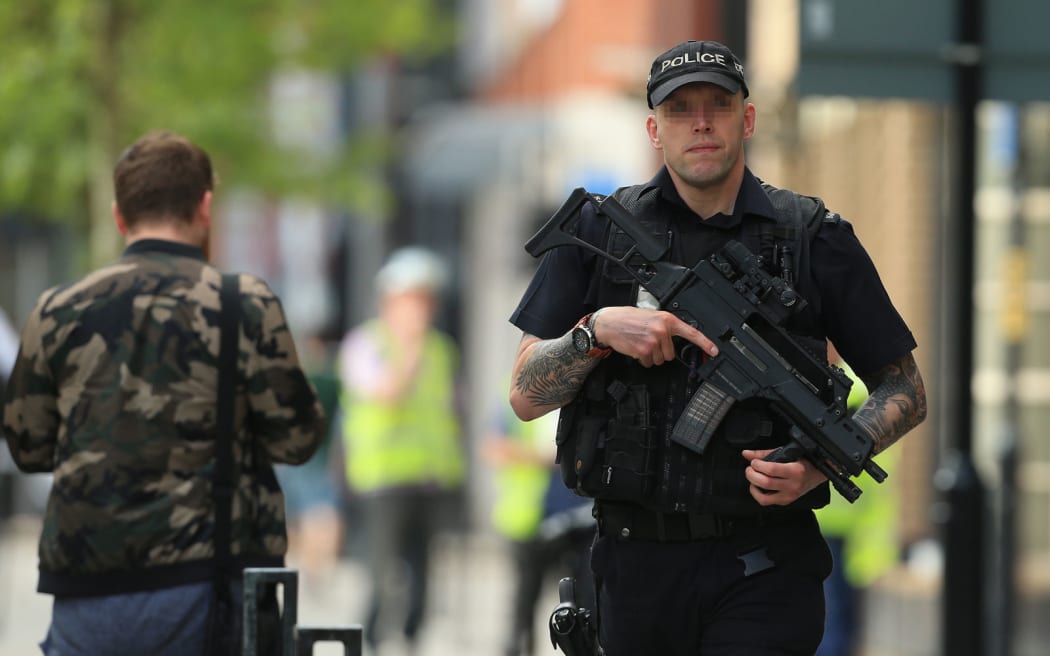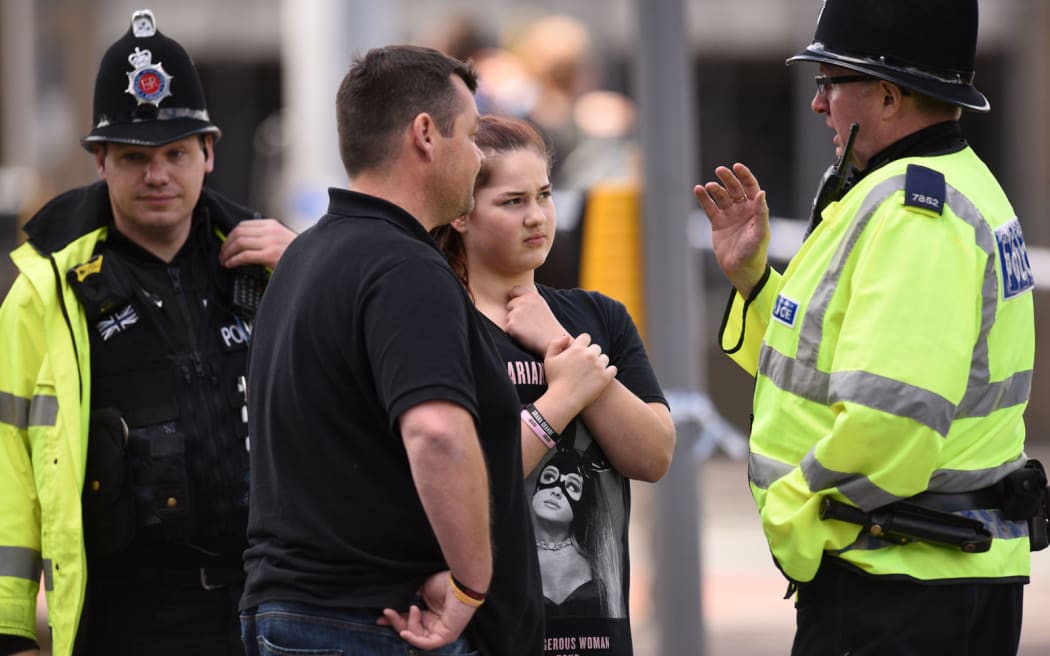Sarah Illingworth lives five minutes walk from Manchester Arena. She shares her experience of the attack.

Messages and flowers outside Albert Square in Manchester. Photo: AFP
This story was first published on Impolitikal.
There have been a number of times over the last couple of years that I’ve heard a helicopter pass above my apartment in Manchester, and thought about how menacing that sound must be in a warzone. And wondered if the sound of a helicopter would ever sound menacing in this way to me.
Then I’ve told myself, “Don’t be so morbid, Illingworth!” But this morning I woke to the continuing screams of sirens and rumble of helicopters I’d gone to sleep to, as police surveilled the area after a suicide bomber killed 22 and injured 59 at a pop concert up the street from my house.
And there was menace in the air.
I live on the border of Salford and Manchester’s city centre, about a five minute walk from Manchester Arena. The Arena is located right next to Victoria train station, a key transport hub – that a friend travels through every day, to and from work, along with many other commuters. I found out something had happened at the Arena, where Ariana Grande had just finished playing a show, when I ventured out of my flat to get some late night snacks from my local corner store. The shop owner asked if I’d heard about the shooting.
“Shooting?”
“At Manchester Arena. Apparently 10 people are dead.”
“Welcome to the fucking future,” was my charming response.
I returned to my flat to find my flatmate diligently scouring the web for information. Most of what was being posted at that time felt speculative – suggestions that a giant balloon had popped, or that some part of the stage apparatus had malfunctioned. Yet the ongoing howl of sirens outside made this hard to believe.
My flatmate, like others in the city, put a call out on Twitter that any kids needing a place to stay, or be safe in, could come to our house.
I was up late on a work call, and by the time this ended around 2am, and I’d finished trawling through online reports attempting to find out what had actually happened at the show – and letting worried friends and family know I was ok – it was 3. At that point, it seemed clear that a terrorist attack had occurred, and I went to sleep feeling pretty somber.
Waking up to find 22 had died – likely including a number of kids and teenagers – was made even grimmer by the still ongoing sound of sirens and helicopters in the street outside.

A man hugs his wife and daughter outside Manchester Arena. Photo: AFP
My mind kept wandering to a Taylor Swift concert I went to a few years ago and the mixture of shock and some horror I felt at the fact the venue was mostly floor-to-ceiling full with girls and women. That’s always been a funny memory for me, but now its nature has changed.
To think of a similar scene at Manchester Arena – packed with young people wildly excited to see their favourite pop star perform, no one considering it a possible death trap – gives me chills.
I ventured out into the day, uncharacteristically bright and sunny for Manchester, and headed to the University of Manchester, where I work two days a week. My street was still blocked off, and there was a gaggle of camera people on the corner, trying to catch bypassers for a quick comment. Someone tried to stop me, camera already in my face, but I told them no.
I’d already done my best to provide a comment to a New Zealand radio station in the wee small hours, and had felt a bit pathetic. What is there, after all, to say? That pop shows should be light and free and fun? We all know that, that’s their point. That it sucks to think that right now 80+ people and their families, friends, schools, communities are terrified and grieving? Seems clear.
I avoided the camera and continued on to work – called a friend, got a coffee, didn’t listen to music so I could catch the feeling in the street, overhear snatches of updates on the situation. But people were chatting normally on their way to work or university, the barista just smiled and took my order – I didn’t even see a newspaper en route.

An armed police officer patrols the streets of Manchester. Photo: AFP
I’ve been struck lately by just how normal terror attacks are starting to feel. Despite their increasing frequency in the West, incidents that would have brought a city to a halt even five years ago barely win a pause among those they don’t directly affect – unless it’s to check social media for updates. The normalisation of terror is in part survival; we can’t stop our lives every time something happens – and wouldn’t that be giving attackers what they want anyway? Attention? A win? But by swiftly moving on to the next online trend, we miss the fact that the world is truly changing around us.
And even complacency is complicit.
Last week the NHS systems were shut down as part of an international cyberattack, sending the nation’s health care system into a spin and forcing people like my friend who works in management in the emergency services to spend a sleepless week trying to ensure patients’ records got where they needed to be. Who’s still talking about that? A couple of months ago someone knifed a policeman outside the houses of Parliament in London, then ran people off Westminster Bridge in a car.
Even for me the chills from that incident disappeared fairly quickly, despite the fact I’d walked through that area and along the Thames a few weeks before it happened.
I’d also walked along the Nice beachfront where a truck bulldozed through people at a market last year, and spent a few days in Berlin in early December, right before another truck did the same thing there. This isn’t intended as a litany of places I’ve been, but my point is, terror attacks don’t feel distant to me – they feel personal, and close to home. They happen in places I’ve been, places I could be, and places any one of my friends or family could be too.
While these events are undeniably evil and tragic, I strongly feel that any response needs to remember that at the root of the hatred that motivates them is injustice. Responding to terror attacks with defiantly pro-West rhetoric is, in my view, fuel to the extremist fire. It only deepens the spiral. I’m not sure what the alternative is, but calling the attackers “evil losers”, who must be “obliterated”, as Donald Trump has done is unhelpful to the nth degree.

A police officer talks to a man and girl wearing an Ariana Grande t-shirt outside Manchester Arena. Photo: AFP
World leaders need to come up with a more effective way of dealing with these issues. I believe this involves addressing a wide range of inequalities and other structural fractures that have been sidestepped for years. It involves a taming of Western arrogance, and a reality check about the shining glory of democracy.
Democracy is broken. Capitalism is broken. Their fix is not necessarily their opposite, but it’s time to stop clinging to ideologies that have clearly run their course. It is time to engage with people, and to listen – and it is time to stop ignoring the real root causes of the pain we see around us.
Depending on whose social media feed you’re following, of course. Clinging to a shiny happy version of the world is naiive and unhelpful. That’s part of our reality, but it’s not the full picture. Please educate yourself, and take the time to try to understand the people and issues that feel tricky and complicated. They aren’t going to go away, and addressing them requires a collective effort.
*Sarah Illingworth is a freelance journalist and Editor at Impolitikal. She has an MSc in Poverty & Development from the University of Manchester.

